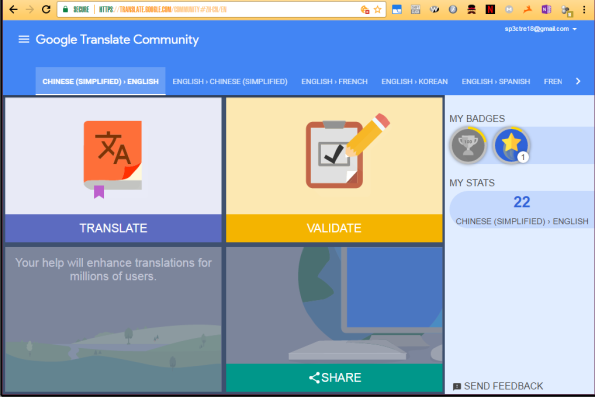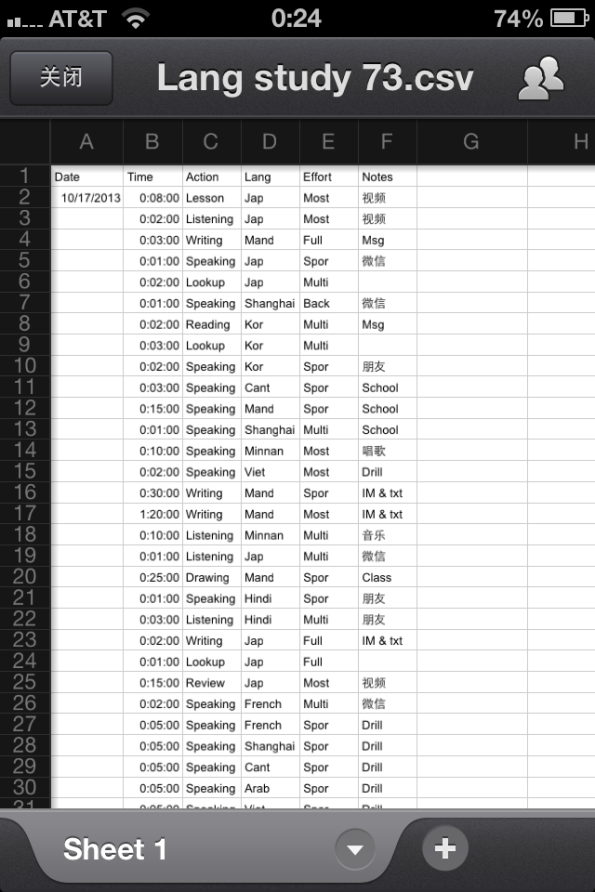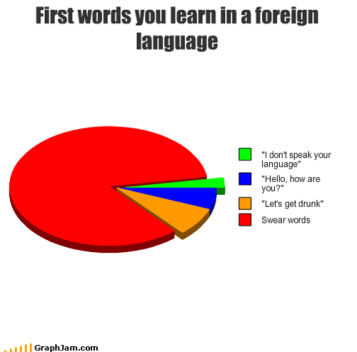Helping with Google Translate = Reading Practice? Vocabulary and Grammar Exposure?
So I’ve got an interesting idea for people who want to practice reading, get exposed to new vocabulary, etc., and would enjoy knowing they’re also doing something good at the same time.
How about helping out with Google Translate?
I was using Google Translate recently and noticed a check mark on a translation that said it was verified by the community.
I clicked the help out link, and came to this: https://translate.google.com/community.
You don’t have to be perfectly fluent to validate, especially if you validate translations TO your native / fluent language(s). If there are any you don’t know or are unsure of, you can just skip! So you can play it safe.
And PLEASE do play it safe, by ONLY validating texts you understand confidently.
So what’s the benefit to you? You will find some unfamiliar words or grammar structures for sure, which you can look up or infer from context and learn for yourself in a context. It may not even interfere with your validation: Google translate wants natural sentences, not just passable ones, so even if you don’t know a word, even if you look up the word and find you can’t be sure of the exact meaning, you can still contribute, if, for example, EVERY translation given is wrong no matter which way you look at it.
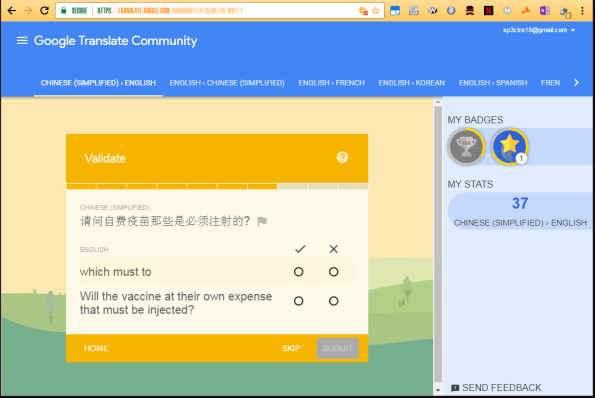
You don’t need to be good at Chinese in any way to know neither English translation is good, natural English
Give it a try!
I validated 100+ already of Spanish, French, and Mandarin to English, and learned a few words, refreshed some others.
WARNING: They warn you themselves that anything can come up in those sentences, of course, so make sure you’re old enough and willing to be exposed to I guess anything people may have tried to translate? Just skip anything you don’t want to deal with!
Performance Review & Progress Report, 2014

In 2009, I started my current stage of language learning by choosing to study Japanese. Before that, I consider myself as having been just like most other people. These “Performance Review” posts try to better show I’m nothing special and you can do this too.
Previous posts: 2013. 2009-2012. 2009.
Hello, 5 year mark! 5 years since started Japanese and began learning various languages. Here’s a quick look at all the languages I touched on and their statuses compared to last year. That’s what this post will cover, and in the listed order. This is not a look back at the past 5 years.
Main efforts
- Mandarin – Notable improvement.
- Korean – Notable improvement.
- Japanese – Slight loss.
- French – Some improvement
- Spanish – Extremely slight improvement
Lesser efforts
- Vietnamese – Slight improvement.
- Shanghainese – Continued, slow advancement.
- Southern Min (Taiwanese / Hokkien) – Continued, slow advancement.
- Thai – Little change, both positive and negative.
- Arabic – Slight Loss.
(the following languages will not be covered in this post since there’s not much to say.)
- Hindi – No change, maintained.
- Cantonese – No change, maintained.
Not targeted
- Hmong – Still ignored
- Yoruba – Still ignored.
- Swahili & Zulu – Still ignored.
- Russian & Greek – Slight loss.
- Morse Code – Some loss.
Performance Review & Progress Report, 2013

Continuing my “Performance Review” series, checking every summer how I’ve done in the past year.
2009 – 2012: In this last post, I went over what I did in those years.
Pre-2009: In this older post, I went over what was my position in languages 3 years ago, before I started learning Japanese and got into this current stage of language learning.
It was in 2009 that I started by current stage of language learning, starting with my decision to study Japanese. Before that, I consider myself as having been just like most other people.
2013 thus marks 4 years since I started these efforts. I’m writing these posts to try to better show I’m nothing special and you can do it too. So, here’s a summary of what I’ve done in the past year.
Main Efforts

 Mandarin Chinese
Mandarin Chinese
Primary Learning Method: Chatting with friends, Chinese interfaces, listening to Music.
Status: Improved: Rating myself using CEFR: High B1, almost B2 if it wasn’t for lacking vocabulary and heavy problems in listening comprehension.
How am I doing?
Although not clear since my description was not in chronological order, the period of time covered in my last post ended just a few weeks after my time in China – remember: I said before the trip, I felt my level was A2, but afterwards it was B1. Before, I was too slow to comfortably instant message (IM) in Chinese, limiting it to select sentences, but upon my return, I surprised both myself and one my main languages partners and friends by being able to carry out the conversation in Chinese. A little slow, but fast enough for IM’ing. A few hold ups when I wasn’t confident or didn’t know a word, but nothing a quick dictionary check couldn’t solve.
Intending to resume studying Japanese, I began pulling away from studying Chinese, slowly limiting the study to vocabulary I collect in flashcards, and stick to mainly practicing it. I made enough friends in China and back here so that I text nearly every day in Chinese, and once a week have at least a short chat online. Once in a while I’d have long, 2 or 3 hour IM conversations, including some video chats over QQ and Skype. Read more…
Project: Crosslingual Character / Syllable Relationships
 As with Romance languages and Latin, many Asian languages share vocabulary through Chinese, but it’s less obvious. I’m thus making a reference table to make them clear and discoverable for learners of more than one Asian language. Help needed! If you’d like to, please contact me! Linguistic knowledge not required.
As with Romance languages and Latin, many Asian languages share vocabulary through Chinese, but it’s less obvious. I’m thus making a reference table to make them clear and discoverable for learners of more than one Asian language. Help needed! If you’d like to, please contact me! Linguistic knowledge not required.
Why Do We Need This Reference?
“Difficult” is a relative term: Spanish, French, and German are considered “easy” languages for English-speakers due to similarities in grammar, vocabulary, and writing, while Korean has practically no relation to English and so may be seen as “difficult.” Neither Japanese, Korean, Chinese, nor Vietnamese share a language family with each other (practically), but they have all seen Chinese influence, creating some common vocabulary between them all, just like how those European languages share Latin roots and words. I would thus argue that once you learn one of these languages, the other languages lose their place as “difficult” since the shared vocabulary (along with grammatical concepts) will serve as a nice springboard toward learning the other.
From my experience and what I’ve seen, this means there are connections you can take advantage of between most Chinese languages, Hokkien languages, Korean, Japanese, Vietnamese, and maybe others to lesser extents (such as through loanwords in Indonesian). However, compared to, say, Romance Languages, these connections may be less obvious due to more drastic differences in pronunciation and writing systems, so I believe we need extra effort.
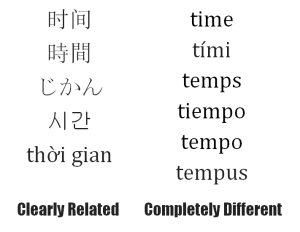
A Table for Comparing and Contrasting
Despite the pronunciation changes, since Chinese languages are made up of a very small set of syllables attributed to various characters, I believe it’s realistic to make a table of all the syllables and include what they sound like in various languages. This will probably be more efficient as a sort of database, but for now, it’s easier to build it as a spreadsheet.
So here’s a sample below. Attempting a neutral option, I placed the Chinese character in the 1st column, and the other columns hold pronunciations of applicable languages. Currently, they are Mandarin, Japanese, Korean, Cantonese, Shanghainese, Southern Min, and Vietnamese. What could we learn from this?
Look at the very first entry and see what you discover. It is the character 学 or 學, which relates to learning. If you can’t read them , the Japanese reading is “gaku” and the Korean one is “hak.” FYI, readings marked with a question mark are ones that I have not confirmed yet, and yes, I know the Mandarin tones are redundant – it’s on purpose. Full disclaimers at the end.

First Real-World Korean-Speaking test
 Ah, that exciting and scary moment when it’s time to converse for the first time after you’ve been learning on your own for a while.
Ah, that exciting and scary moment when it’s time to converse for the first time after you’ve been learning on your own for a while.
Korean had been barely been a subject of my study during my first 3 years of my recent language-learning efforts, but it had been there nonetheless; once in a while I’d pick up a couple more words from songs, listen to a Talk To Me in Korean lesson that I was curious about, maybe search online how something is said in Korean, etc. However, it wasn’t until Fall of 2012, when I started the TCBP Korean Study Group at my university, that I finally managed to get back into studying Korean more regularly and seriously.
Now it was summer, yet the study group has continued since most of the students were still around, so I had kept up the study. One of my friends graduated at the end of the first half of summer, so we went out for a farewell lunch as he was going back to China and had a job lined up for him there. He told me about a Korean restaurant we should go to, so we did. I was excited because he said it was in fact run by Koreans.
Then I Saw Her Face….
…of an older woman, near my friend’s table (he got there first), so I assumed she was the waitress. Having heard me come in, she turned around and the first thing she said to me was:
안녕하세요! (Annyeong haseyo)
I was momentarily stunned; why would you greet someone in Korean like that? We’re in America here!
I kid you not: I do not remember how I responded. That part of my memory is gone for some reason. I do not remember if I responded in Korean or English, since I was not expecting to be required to switch that quickly. If I did respond in English, I probably did immediately follow up in Korean.
Turns out my evil friend told her that I had been studying Korean “for years.” Of course, the consequences of that little detail wouldn’t affect the early conversation, but I didn’t like that she might have high expectations from me. However, it may have been a good thing. since it could have been part of the reason why later, she was willing to speak Korean, giving me the chance to practice speaking a good bit.
However, anything else right after the hello, as I sat down, was in English, and she left us to look over the menu.
When she came back, we somehow got back into Korean; I think she started it, actually. She took my order (in Korean), and then when she came back with the order, we spoke a little more. The sentences I remember from the whole experience were (and these are NOT literal translations):
- You can speak Korean?
I can speak a little. - How long have you been studying Korean?
I’ve been studying for 1 year. I am studying with a friend. (I blanked on “year”; and although it was coming to me, she herself ended up telling me what it was before I remembered it confidently enough) - Have you been to Korea?
No, but I would like to go someday. Actually, the friend I am studying with will go to Korea next year. Therefore, we are learning Korean together. (Messed up a good bit in getting the logical order of the sentences and their conjunctions, and I restarted a few times before I got it all out. To be honest, I over-thought it and shouldn’t have worried too much about making mistakes.) - Do you live in an apartment?
No, I live at home with my parents. (Missed the word apartment; she had to tell me in English.) - Are you ready?
Yes. This: one gobdol bulgogi and one Ssaek Ssaek grape [a canned drink] please. - Me: How old are they? [Asking about her children]
Her, in English: They are 27 and…
Me, in Korean: Could you please say it in Korean ?
Her: My children are 29 and 27 years old.
Me: Ah, 29 and 27, ok.
- Come again, have a good day! (or something along those lines; can’t remember)
Thank you! Goodbye!
Doing Things Right: When Practice Comes without Effort
 Set up your environment so that the language comes to you automatically. Then, your continued practice is assured regardless of what may personally hold you up.
Set up your environment so that the language comes to you automatically. Then, your continued practice is assured regardless of what may personally hold you up.
I recently had another interesting, fun, cool milestone – without trying or noticing. I thus wanted to share it and describe briefly how and why it happened, and how you could allow it to happen to you too.
The Picture that Showed it All….
So I had a long, busy day, the kind that would normally make me think I wouldn’t be able to get any decent language practice in, but as the day went by, I was noticing I was still managing some here and there. It was so busy, though, that I had not entered anything into my log by the end of the day, and I really didn’t feel like having to think over my whole day to go over this little chore. However, for my readers, for future readers, for language learners around the world, for the furthering of human progress…. I made myself spend the 10 minutes or so necessary to recall my day and write everything in. Yes, it took a while, but as I neared the end of my logging, it hit me (time is in h:m:s):
Did you count how many languages were represented?
- Japanese
- Mandarin
- Shanghainese
- Korean
- Cantonese
- Minnanhua (Southern Min) / Taiwanese
- Vietnamese
- Hindi
- French
- Arabic
Now, since I’m not expecting you to decipher my shorthand notation, I’ll clarify a few things. “Time” refers to minutes elapsed doing the action from beginning to end (shown here in h:m:s format, though I only use minutes and hours). “Action” is self-explanatory. “Effort” describes an estimation of how much of that time was actually dedicated to or spent on the action, and the options are Full, Most, Multi(tasking), Spor(adic), & Back(ground) (initially conceived to represent listening to music in the background, but that I now use to refer to 10% effort or less). So “Most” means 80% of that time was doing the labeled action, and “Spor” would mean maybe 20%. Therefore, if there are 10 minutes with a “Spor” label, that means that if I cut out whatever else I was doing in those 10 minutes, I really only spent what would amount to 2 full minutes of the specified action. Finally, the “notes” is an extra label for as useful detail such as whether I was watching TV, listening to music, talking to a friend, texting, etc.
I am not saying I practiced 10 languages significantly in one day. I never make such judgments because any and all practice is significant. I know only a small handful of words and phrases in Arabic; any amount of thinking about it will help prevent losing what I know. Look the time spent every time. Some are 20 or 15 minutes, but most are just a few. We usually have spare minutes that we waste either just idling, or thinking or doing unnecessary things. Instead, use them wisely; they could amount to an hour or hours after a week or so.
Also note this is just a single day. While it’s a great milestone to notice, it only happened once, and I hope to see it happen more often – if I am indeed doings things “right.”
How did it happen?
Here comes the breakdown. How much sounds naturally occurring to you? In other words, a natural event just like anything I may do normally in English that did not require me to choose the foreign language. I hope you see that most of it was so, since a lot of it involved meeting friends, friends texting me, or friends leaving me voice messages. Still, I figure we can divide it into 3 categories. The first, are everyday events that normally happen in English but occurred in a different language without my control. Second would be interactions where it was my choice to act in the foreign language because someone else initiated or because the opportunity came up. Third, things that were completely my own decision and effort.
- Natural Event: Natural, everyday event
- Two-Way / Choice: Taking or responding to an opportunity
- Self-Initiated: Solely initiating a stand-alone event
How My First Language Meetup Showed Me I did NOT Forget my French
 Did you really forget that foreign language? I share my first language exchange meet-up, that led to over 2 and 1/2 hours of French!
Did you really forget that foreign language? I share my first language exchange meet-up, that led to over 2 and 1/2 hours of French!
You haven’t spoken one of your foreign languages in some years. You come upon a situation where you are made to try speaking it. The words are slow to come, some seem forgotten, and you’re barely putting together cohesive sentences. You sound like an utter beginner, so you conclude what you’ve been suspecting: you’ve practically forgotten the language.
But have you really? That’s what I believed about my French, until this experience showed me otherwise. I haven’t spoken anything more than a few random sentences of French for over 6 years. I have not EVER spoken French for more than 30 minutes – and that was only once; 10 minutes was probably my usual maximum. I have, however, listened to French an hour or so, such as watching TV, but that was also rare. More details on my French level here. I thus considered myself unable to speak French anymore. The first half of this post will be a re-telling of that experience, and then I will use it to answering that question.
Language Meetups
I’m sure it’s not uncommon to hear of groups that get together once in a while for for special interests such as sewing, debates, book discussion, and so forth. It’s definitely a nice idea for anything that needs cooperation or when one is looking for people with the same interests. But have you ever looked for or gone to any for a subject of study? What about languages? Do you use Meetup.com?
Finally, I can speak of my own experience, when I went for my first French language meet up.
No-English week and day: Being on a Roll and Keeping the Ball Rolling
I’m extremely busy as I’ve had some hardware failures on my computers that put some of my data at risk, but I wanted to see if I could take a bit of time to knock out an unfancy post. There may be typos; I will correct in time.
I’d like to share two good, recent, level-up / improvement experiences involving Mandarin. One was self-created, while the other was more coincidental, and I put the effort in to keep it going,
Since I always consider my language learning as quite the side project that I mostly fit into literally spare minutes and seconds, I always say I have very “lazy” and relaxed approach – something I would NOT necessarily recommend to someone, but something I’ve realized is still an option. For the most part, I have no goals other than “keep learning and see how it goes.” I have no motivational urge other than “Do it when you can – just make sure you notice those times when you can.”
However, I’ve developed drives, hopes, and somethings like goals as I’ve gone deeper into languages, particulalry Mandarin and Japanese. So, for those I have a focus on, I do give myself a push once in a while. My “lazy” approach is not a chosen method I subscribe to; it’s merely a relaxed, stress-free approach out of necessity, but if I realize I can afford the time and effort, I will definitely add that effort.
The Chinese-only week (really, a non-English week)
I have a few Chinese friends and some more Chinese acquaintances. I can’t get myself to practice speaking with them. I don’t have a lot of time, it’s hard to find good friends, I don’t see them often, etc., so when I do see them, I’d rather use that time wisely to get to know each other better and just be friends, rather than “waste time” practicing Mandarin. That being said, I’m at a level that, while speaking and following conversation is still pretty problematic, I can actually manage a lot – as long as the other person slows down a teeny bit and is willing to work with me. I’ve met people and spoken to them for 30 minutes to an hour. I go to an Asian market and get around in Chinese. But I needed to do this with my friends.
So I simply announced I would be doing this for a week. If I ran to any other friends or acquaintances who didn’t see / couldn’t have seen my announcement on social networking sites and they tried speaking English to me, I’d tell them this was my “Chinese-only week” and would kindly request their help and support.
And it worked, of course. I had a little bad luck in that I had less chances to see my friends than usual, but those I saw worked with me and stayed away from English. Only when something really problematic or important came up, did I switch to English. Merely by listening to people talking to me and being able to ask a few questions as necessary, I even picked up a few new words, confirmed the usage or pronunciation of some words and phrases I had learned but never heard before, and got a few corrections.
Two weeks later I had a different situation. Read more…
Starting Out: Shanghainese and Taiwanese 1
 Documenting my first forays into a new language!
Documenting my first forays into a new language!
I just started looking into Shanghainese and Taiwanese. Here’s how I’ve been starting out. I still can barely use Cantonese, but I want to try picking up at least a little of these other languages. Now, why am I doing this? Well, I’m trying push myself (I’m really pushing common beliefs / misconceptions, rather than myself, I think) in a different way now. Is there really a limit to how many languages you can tackle at once, or is it really all methodology and attitude, as I suspect? I should point out, though, this is will not be a project of primary focus. Rather, I want to see if it’s possible to learn them on the side, with little effort, and still retain them – especially if they’re similar in some way.
So, why these languages? Here’s a little about them to explain why I chose them.
Taiwanese
A lot Chinese dramas and pop songs known internationally come from Taiwan, and it’s been pretty common for me to meet Taiwanese and people from southern Fujian. Yes, that’s right, with it, I will also be able to communicate with people from southern Fujian province in China, including people from the city of Xiamen. In this sense, it is called Minnanyu or Minnanhua in Mandarin, with the “Minnan” meaning Southern Min. A small issue: Fuzhou, another big, famous city whose emigrants I seem to keep running into in America, is just a bit too far north. They speak Mindong, or Central Min. Hopefully it’s close enough for SOME level of comprehension, but some people seem to say it’s closer to Minbei (Northern Min, if you didn’t see that coming) than Minnan. Oh well. It would still serve me well for talking with Taiwanese people. Variants are also spoken in Singapore, Malaysia, Philippines, and I’m sure other places as well. Read more…
My 3-Year Performance Review & Progress Report, 2009-2012
 In this last post, I went over what was my position in languages 3 years ago, in 2009, before I started learning Japanese and got into this current stage of language learning. After reading that post, I hope I sounded like a pretty typical person. I haven’t done anything impressive, so I hope many people who may think it is can see that I don’t have any special history, skill, or natural talent that has allowed me to get to where I am now. I simply do it without consideration of excuses and misconceptions.
In this last post, I went over what was my position in languages 3 years ago, in 2009, before I started learning Japanese and got into this current stage of language learning. After reading that post, I hope I sounded like a pretty typical person. I haven’t done anything impressive, so I hope many people who may think it is can see that I don’t have any special history, skill, or natural talent that has allowed me to get to where I am now. I simply do it without consideration of excuses and misconceptions.
This is a review of what I’ve accomplished in the past 3 years, up to summer of 2012, with a brief overview on how I did it, so that you can do it too. For that reason, links will be provided to any mentioned resources, but check out my Language Resources Page for a full list.
So now it’s time to go over what’s actually happened, and where I am now.
In case you’re looking for something specific, I’ll let you know this article mentions:
- Japanese
- Mandarin
- Hindi
- Korean
- Morse Code
- International Phonetic Alphabet
- Russian & Greek
- Vietnamese
- Cantonese
- Hmong
- Yoruba
- French
- Spanish
The Decision
Which Language?
Starting Japanese is the big landmark marking where everything started. I wanted to start a new language, with not much of a goal in mind other than to see how it goes, how far I get, and how quickly I learn. I wasn’t going to put much effort since I foresaw myself getting busier in the upcoming years, and wasn’t going to care much for motivation. The only motivation needed is to do it: keep it in mind, do it when possible, but make sure I find that time and make time as possible. I considered Italian since I’ve had the interest and it would be easy, but it’s pretty close to Spanish, so I saw little need. German seemed like a good choice, but you know what? I decided I wanted something considered totally different, so let’s check out East Asia, I thought. Chinese characters, yes! So Mandarin or Japanese? I felt Mandarin would be more useful, and I have a little more interest in China culturally, BUT I had already started watching some anime, listening to some Japanese music as introduced to me from anime, and I was beginning to pick up a tiny selection of words. Thus, Japanese had the better and most promising opportunities for “practice.” Japanese it was!
Common First Step to all Languages
Something else I do to gauge interest and get a feel for a language, is to check out its grammar, so whenever I’m curious about a language, I go look over its article on Wikipedia, looking for the grammar section or grammar article.
The scary G-word is definitely something too many people over-concern themselves with (eg., in school courses), but I do believe it’s nice to start with it. What distinguishes a language and gives it its personality, its attractive qualities? I would say grammar! If languages didn’t have differences in word order, structure, parts of speech, conjugation, etc., learning language would be nothing more than learning vocabulary to swap out, and translations could be made virtually word-for-word. So I read up on grammar.
In the case of Japanese, then, I learned that it doesn’t necessarily use a Subject-Object-Verb (SOV) structure, but it is instead primarily a topic-comment structured language. Topics can be dropped if obvious, and it’s much more common (informally) to make extremely short or single-word statements than in English. Questions are structured the same way as statements, only with question words and/or just a “ka” at the end. Different tenses/moods/aspects exist, but all persons (I, you, they, etc.) use the same conjugation. Seeing example sentences helped me see what this all means and how it really comes together.
After reading up on the basics of a language’s grammar, no matter how I continue learning, I’ll better understand why words are coming together the way they are, and the boost to my interest in the language helps make sure I keep going. Read more…
